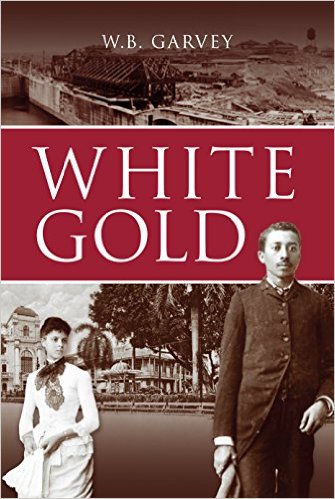Book Review: White Gold
Reviewed by:
Carol TaylorThis sweeping historical novel follows aspiring railroad engineer, William
Roberson, from his Jamaican homeland in 1897 at 16, to Panama, to help build the
Panama Canal, the biggest, most perilous, and most renowned ship canal in
history. With White Gold, Garvey continues the story he started in his first
novel Panama Fever: Digging Down Gold Mountain.
Garvey is a relative of the Jamaican hero,
Marcus Garvey. While going through
his father’s papers, he learned that his grandfather had been a railroad
engineer who helped construct the Panama Canal. This prompted years of research
that led to Panama Fever and White Gold, his chronicle of the monumental effort
to link the world’s two great oceans.
The Panama Canal is a 48-mile ship canal that connects the Atlantic Ocean to the
Pacific Ocean and is a key conduit for the international maritime trade. France
started work on the canal in 1861, but was defeated by tropical diseases;
malaria, cholera and typhoid fever, to which the “noirs” were supposedly
“immune”. The United States took over in 1904, and took a decade to complete the
canal, which officially opened in 1914. Spanning almost 30 years the Panama
Canal was one of the longest and most difficult engineering projects ever
undertaken and it greatly reduced the time for ships to travel between the
Atlantic and Pacific Oceans. The creation of the Panama Canal was a phenomenal
undertaking that continues to this day.
In the late 1800s West Indians and African Americans flocked to Panama to work
and try to thrive under racist colonial and Jim Crow segregation treatment by
whites. Years into working on the canal, Roberson struggles to make a living but
finds himself at odds with his new wife Winifred, and his Panamanian mistress
Isabella in whose arms he finds solace when Winifred returns to Jamaica.
White Gold tells the story of the engineering mastery, technical expertise and
sheer manpower that went into the conception and creation of the canal, while
also telling the stories of the men who felt driven to make it happen. Among
them is Edward Bower, a master mechanic who leaves Jamaica on his second trip to
work on the canal, and takes Roberson under his wing. Roberson’s older cousin
Thomas Judah who, chafing under the colonial yolk in Jamaica left years earlier
and made his fortune in gold but lost his best friend to the mine. As the
bastard son of a rich man who jilted his mother to marry another, Judah was well
off in Jamaica, but sought to make a name for himself outside of that of his
wealthy father who never claimed him. He secretly helps Roberson, an orphan,
while he is in Panama by making introductions; one is to Henri Duvay, the French
engineer who stayed in Panama because of his obsession with finishing the canal.
Rounding out this cast of characters who could be no more different from each
other is 15 year-old Boy-Boy who leaves Barbados for Panama to join his father
in hopes of making enough money to pay for college.
I enjoyed their stories in White Gold and the way they each tell the overarching
story of the Panama Canal. At almost 500 pages, in less able hands, White Gold
could have been a daunting and arduous read. Luckily Garvey’s meticulously
detailed account is also equally colorful and reminiscent of place and time in
telling a story that helped to shaped not only Panama but also the world.
Garvey is a very good writer with a certain flair but this is a double-edged
sword. I wished that I wasn’t so aware of his sometimes densely overblown
writing, which at times, intruded on his quite excellent storytelling. “Thornton
leveled him with a fish-eyed stare reputed to turn the most resolute native
spine into jelly, but to his annoyance the lad stood firm. ‘One moment,’ he
finally snarled in a tone that would curdle cream, then vanished behind the dark
sliding doors of His Excellency’s inner offices.”
White Gold’s account of the building of the canal is an in-depth history lesson
and will appeal to history and historical fiction lovers, and anyone who has
ever left their native land to make a better life. His descriptions of turn of
the century Panama will transport you to the squalor of a dirt-poor people and
the sweeping grandeur of a lush and mineral rich country that made up, in equal
measures, Panama at that time. A riff on the interplay of capitalism,
colonialism, racism, and classism; White Gold is an entertaining and educational
sojourn to a time and place that changed history and the people who helped to do
it.

